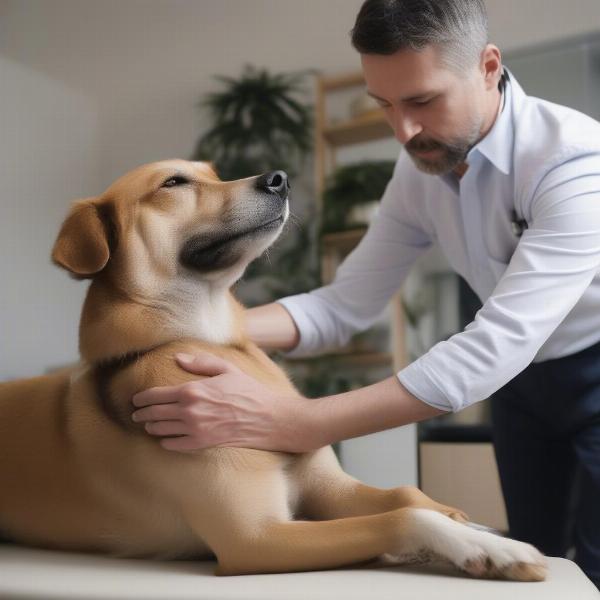Chiropractic care for dogs, often referred to as “chiro for dogs,” is a complementary therapy gaining popularity among pet owners. It focuses on the relationship between the spine and nervous system, aiming to improve overall health and well-being. This article explores the benefits, risks, and considerations for using chiro for dogs, offering valuable insights for both new and experienced dog owners.
What is Chiro for Dogs and How Does it Work?
Chiro for dogs, similar to human chiropractic, involves manipulating the spine and joints to restore proper alignment and function. This gentle, hands-on approach addresses subluxations, which are misalignments in the vertebrae that can cause nerve interference, pain, and restricted movement. By correcting these misalignments, chiro for dogs aims to alleviate discomfort, improve mobility, and enhance the dog’s overall quality of life.
 Chiropractic Adjustment for Dog
Chiropractic Adjustment for Dog
Benefits of Chiro for Dogs
Many dog owners report positive results from chiro for dogs, including:
- Pain Relief: Chiro can alleviate pain associated with arthritis, hip dysplasia, and other musculoskeletal conditions.
- Improved Mobility: Restoring spinal alignment can enhance flexibility and range of motion.
- Enhanced Athletic Performance: For active dogs, chiro can help optimize performance and prevent injuries.
- Reduced Inflammation: Chiro can help manage inflammation and promote healing.
- Improved Overall Well-being: By addressing nerve interference, chiro can contribute to a dog’s overall health and vitality.
When to Consider Chiro for Dogs
Chiro for dogs may be beneficial for a variety of conditions, including:
- Arthritis
- Hip dysplasia
- Intervertebral disc disease (IVDD)
- Back pain
- Neck pain
- Limb lameness
- Difficulty moving or jumping
- Recovery from injuries or surgery
Choosing a Qualified Dog Chiropractor
It’s essential to choose a qualified and experienced dog chiropractor. Look for a professional who is certified by the American Veterinary Chiropractic Association (AVCA) or a similar reputable organization. Always consult with your veterinarian before seeking chiropractic care for your dog. They can assess your dog’s condition and advise if chiro is a suitable treatment option. This is especially important for dogs with certain medical conditions, such as fractures or tumors. dog chiropractor offers helpful advice on selecting a practitioner.
Risks and Considerations
While generally safe, chiro for dogs does carry some potential risks, including:
- Temporary soreness: Some dogs may experience mild soreness after an adjustment.
- Exacerbation of underlying conditions: In rare cases, chiro can worsen existing conditions if not performed correctly.
- Fractures: Although rare, fractures can occur if the adjustment is not performed by a qualified professional.
Conclusion
Chiro for dogs offers a potential pathway to improved well-being for many canines. By addressing spinal misalignments, this therapy can alleviate pain, enhance mobility, and support overall health. However, it’s crucial to remember that chiro should be performed by a qualified professional and should complement, not replace, traditional veterinary care. Always consult your veterinarian before considering chiro for your dog to ensure it’s the right choice for their individual needs. Remember to research qualified professionals in your area and discuss any concerns with your veterinarian.
FAQ
- Is chiro for dogs painful? Adjustments are typically gentle and not painful. Some dogs may experience mild soreness afterward.
- How often does my dog need chiro adjustments? The frequency of adjustments varies depending on the dog’s individual needs.
- Can chiro cure my dog’s arthritis? While chiro can help manage arthritis symptoms, it’s not a cure.
- Is chiro safe for senior dogs? Yes, chiro can be beneficial for senior dogs, but adjustments may need to be gentler.
- What should I expect at my dog’s first chiro appointment? The chiropractor will assess your dog’s spine and overall condition before performing any adjustments.
- Can chiro help my dog after surgery? Chiro may help with post-surgical recovery, but consult your veterinarian first.
- Are there any breeds that shouldn’t have chiro? Certain breeds with spinal abnormalities may not be suitable candidates. Consult with a veterinarian.
ILM Dog is a leading online resource for dog owners worldwide, providing expert advice on all aspects of dog care, including breed selection, health, training, nutrition, grooming, and more. We strive to empower dog owners with the knowledge and resources they need to provide the best possible care for their furry companions. If you have specific concerns regarding your dog’s paralysis, you may find should i euthanize a paralyzed dog a helpful resource. For more information on canine intervertebral disc disease, please refer to our comprehensive article on cervical ivdd in dogs. Contact us at [email protected] or +44 20-3965-8624 for personalized guidance. ILM Dog is committed to supporting your dog’s health and happiness.